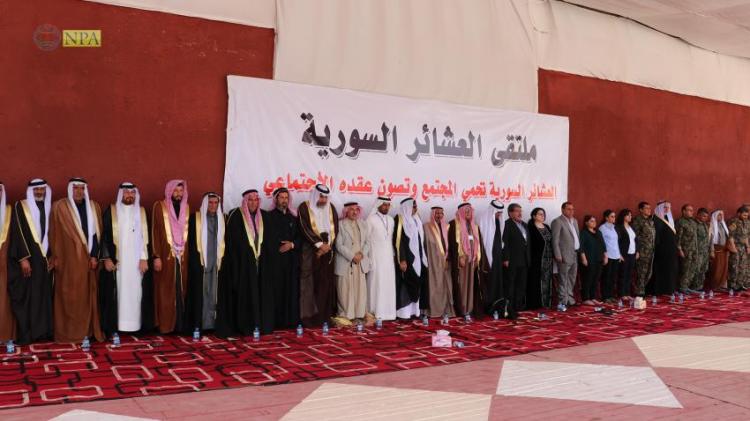Syrian clans refused to return to pre-2011 and demand decentralization
The Syrian clans held a forum on Friday, in Ain Issa town, sponsored by the Syrian Democratic Council with the presence of more than five thousand people of prominent figures from the Syrian clans all over the country, as representatives of 67 tribes and clans.
The forum met international and domestic disapproval reactions. The Russian and Syrian Foreign Ministers condemned the holding of the forum, and the Russian Foreign Ministry considered it a bid to scuttle Astana.
Sheikh Shamos Al-Nufal, the Sheikh of Al-Ageidat clan in Deir Ez-Zur, said to North Press that the clans had an important and a central role in most of the Syrian regions pointing out to their role in calming down the situation in Deir Ez-Zur after the demonstrations of Al-Bseira, considering that there were hidden hands and political purposes behind it.
Al-Nufal pointed out, “there were several sides that might be behind these demonstrations, such as ISIS, the Factions of the Euphrates Shield or even the Syrian Government, which aimed to destabilize the security in the region.”
Moreover, he stressed on the importance of the clan’s situation in Deir Ez-Zur, in the case of the agreement with the Syrian Government, referring to the talks of the Syrian Democratic Forces and the Syrian Government, because most of the clansmen were wanted to the Syrian Government. He even stressed that the clans should have a role in the coordination and negotiation between the two parties.
A delegation of the Democratic Self-Administration of north and east of Syria visited Russia on December 24th, 2018, and brought out a 10-point- road map to solve the Syrian crisis.
The lord of Al-Khawatna clan, Muhammad Al Hasan, which is one of Shammar tribes, demanded the Syrian Democratic Forces to set the people, who were innocent of committing crimes in Syria, free and reveal the fate of the detainees, referring to the ambiguity in dealing with the detainee’s file.
Last March, the Self-Administration in North and East of Syria released about 283 prisoners in all areas of Syrian north, who were associated with ISIS, this was at the request of the clans’ elders and the residents of the region.
Sheikh Asaad Al-Bashir of the Turkman’s clan in Raqqa, pointed out to his clan’s support of the other clans in confronting terrorists, clarifying that they hope to remain united to deal with the challenges face the country’s future.
Al-Bashir said that the foreign interference in Syria is a fact, especially for the countries whose interests intersect with the continuity of problems and chaos, mentioning that with the strength his people of all components, they can combat these interventions.
He added that his clan is not subordinated to Turkey, rather, to their own country, and that the war they have been through was against terrorists. Furthermore, they consider the dialogue with Turkey a good step if it was to resolve the outstanding problems and to know Turkey’s points of concern.
Al-Bashir repeated what Al-Nufal said that they did not accept the return to the previous era, pointing out that the terms of negotiations with the Syrian government must be to guarantee a united, democratic and decentralized Syria.
Arab tribes and clans have played a prominent role in fighting the Islamic State Organization in Raqqa and Deir Ez-Zur, where dozens of members from the clans lost their lives during their fight alongside the SDF, against the Islamic State.
Sheikh Saddam Munther al-Jarba, one of the elders of the Shammar clan, explained that their role was effective in defending the region of Aljazeera and the north of Syria, and they were in a trench with the Arab and Kurdish clans, and that they are with the Syrian-Syrian dialogue.
Walid al-Hamada, one of the leaders of Afrin region, northwest of Syria, said that their aim of attending the forum is to “join hands with the forces of the other Syrian clans’ leaders to demand all national forces fighting in Syria to liberate Afrin and all occupied Syrian cities.” Referring to “the continuing violations committed by the factions allied with the Turkish army against the people in Afrin.”
A member of the presidential council of the Democratic Council of Syria Sihanouk Dibo said that after the termination of the military presence of the organization, they developed a strategy for post-ISIS phase, which includes intensifying meetings between the various activities of the Syrian society, including the Forum.
Dibo added that the main objective of the forum is “to convey multiple messages to the regional powers, whether Turkey or Iran, that there is no place for their agendas that they constantly announce in the region,” adding that their project does not threat the national security of any other country. Furthermore, he said that the Self-Administration aims at returning Syria to all Syrians and that Syria is on the same border with Turkey and they have historical links with each other. Also, they accept to negotiate with Turkey on a condition of ending its occupation of Syria.
The commander-in-chief of the Syrian Democratic Forces, Mazloum Kobani, said during a speech at the opening of the “Syrian Clans Forum” that they hold indirect talks with Turkey through mediators and that they are ready to understand Turkish views.
Ein Issa – Fattah Issa /Gihad Nabo-NPA

